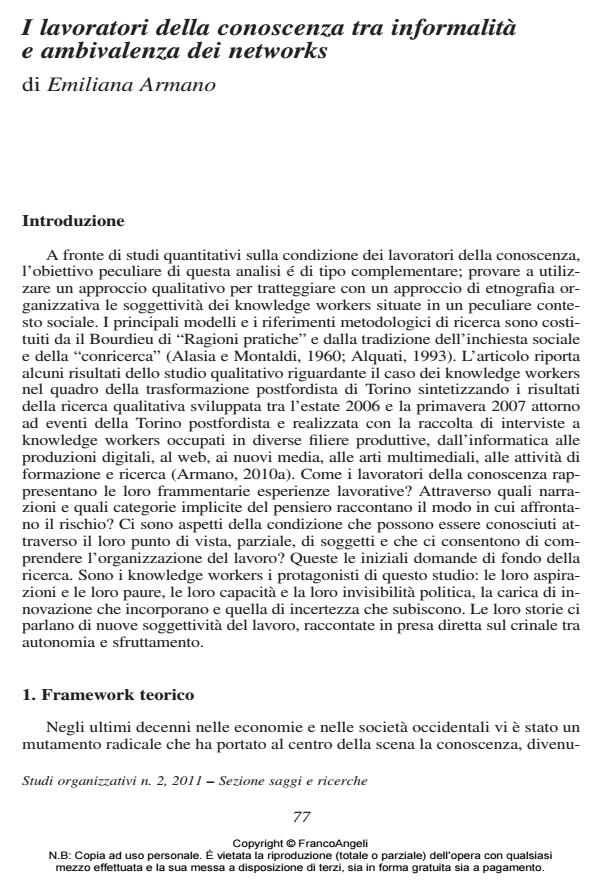I lavoratori della conoscenza tra informalità e ambivalenza dei networks
Titolo Rivista STUDI ORGANIZZATIVI
Autori/Curatori Emiliana Armano
Anno di pubblicazione 2012 Fascicolo 2011/2
Lingua Italiano Numero pagine 26 P. 77-102 Dimensione file 527 KB
DOI 10.3280/SO2011-002004
Il DOI è il codice a barre della proprietà intellettuale: per saperne di più
clicca qui
Qui sotto puoi vedere in anteprima la prima pagina di questo articolo.
Se questo articolo ti interessa, lo puoi acquistare (e scaricare in formato pdf) seguendo le facili indicazioni per acquistare il download credit. Acquista Download Credits per scaricare questo Articolo in formato PDF

FrancoAngeli è membro della Publishers International Linking Association, Inc (PILA)associazione indipendente e non profit per facilitare (attraverso i servizi tecnologici implementati da CrossRef.org) l’accesso degli studiosi ai contenuti digitali nelle pubblicazioni professionali e scientifiche
The aim of this paper is to summarizes the findings of a qualitative research on subjectivity of knowledge workers with reference to the main organizational studies. The analysis takes as its main methodological references Bourdieu’s "Practical Reason" and the Italian tradition of social enquiry and co-research and is based on interviews with knowledge workers who make of knowledge creation, development and transmission their own strengths, with particular reference to jobs in the field of the new media and information technologies in Turin. The substantive categories of the narratives revolve around the informal nature of relations what has proved crucial for an understanding of the modus operandi and the organizational implications. There is a sort of compulsive, lively and coactive sociality, in which the norm is to be in the network. Knowledge work often informally connects people and objectives in a porosity of fluid roles among various projects. Being in the network, an informal area of temporary roles with temporary rights and duties, seems be the tipical condition. Elevated informality, self-exploitation, but also immedesimation. The jobs are insecure but with substantial motivational and emotional rewards, and lower pay is accepted even when great commitment is demanded. It is a type of working condition which, with its characteristics, would appear nowadays as typical in an upper level of work, that of knowledge working, as were long-term relationships, high salaries, proceduralisation, repetitiveness of tasks and alienation in the type of work prevalent in the large enterprise in the Fordist phase.
Parole chiave:Knowledge work, network, risk society, postfordism, subjectivity
- Posizionamenti liminali tra autonomia e dipendenza. Il caso del settore bancario e assicurativo Andrea Bottalico, Annalisa Murgia, in STUDI ORGANIZZATIVI 2/2023 pp.35
DOI: 10.3280/SO2022-002002 - Fattori organizzativi e processi di condivisione della conoscenza nelle strutture turistiche complesse. Il caso Villa Medicea "La Ferdinanda" di Artimino Sara Lombardi, Vincenzo Cavaliere, in STUDI ORGANIZZATIVI 2/2016 pp.39
DOI: 10.3280/SO2015-002002
Emiliana Armano, I lavoratori della conoscenza tra informalità e ambivalenza dei networks in "STUDI ORGANIZZATIVI " 2/2011, pp 77-102, DOI: 10.3280/SO2011-002004